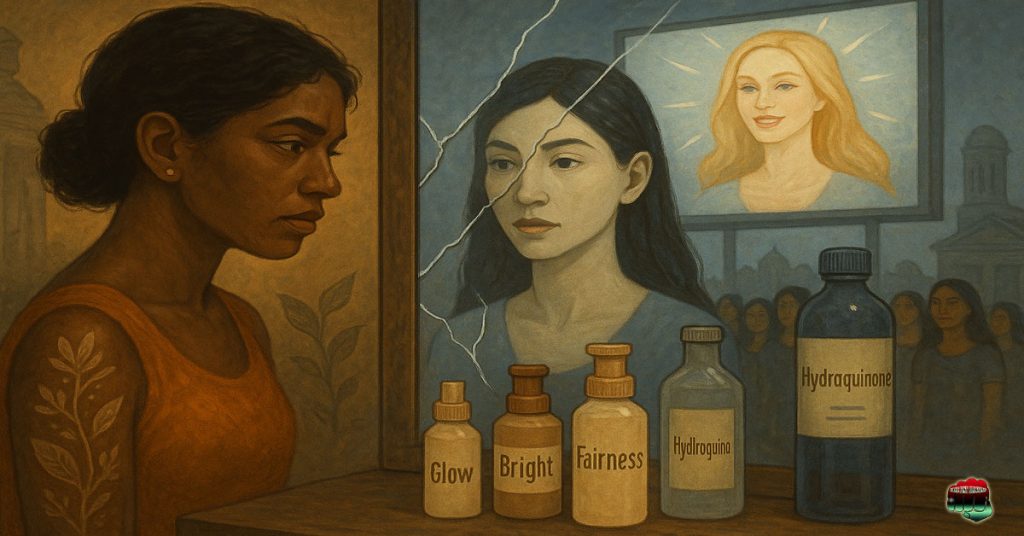InnerKwest Staff | Investigative Culture Report
Introduction: The Color Line, Still Drawn
From Accra to Manila, from Mumbai to Kingston, and from the halls of Hollywood to the stages of K-pop, a global obsession simmers just beneath the surface: the pursuit of lighter skin. It manifests in billboards, beauty products, music videos, and social media filters. But this isn’t merely a beauty trend — it’s a centuries-old inheritance of colonial domination, internalized racism, and economic stratification. Skin whitening is not just a multi-billion-dollar industry; it’s a symptom of a deeper, often unspoken global trauma.
Colonialism’s Lingering Shadow
The origins of global colorism lie in empire. European colonizers imposed racial hierarchies wherever they went, often aligning lighter skin with civility, power, and intelligence, while darker skin was linked to labor, savagery, and subjugation. In regions like the Caribbean, Southeast Asia, and sub-Saharan Africa, the more European one looked, the closer one could climb to social and economic privilege. That legacy has not only persisted — it has adapted.

Today, remnants of colonial thinking pervade societies in subtle yet pervasive ways. In many post-colonial countries, skin tone remains a proxy for class, desirability, and modernity.
A Billion-Dollar Complexion Complex
The global skin-lightening industry was valued at over $8.6 billion in 2022 and is projected to surpass $12 billion by 2027. Multinationals like Unilever, Procter & Gamble, and L’Oréal continue to market products that promise “fairness,” often under rebranded euphemisms like “glow,” “brightening,” or “tone correction.”
In Nigeria, Philippines, India, Thailand, and beyond, skin-lightening products fill pharmacy shelves and social media ads. Glutathione IV drips, Kojic acid soaps, hydroquinone creams, and illegal mercury-laced concoctions are widely accessible, despite documented health risks including kidney failure, cancer, and severe skin damage.
Mainstream Media as a Whitening Machine
Western beauty standards dominate global media. White or light-skinned models are over-represented in advertising across Africa and Asia. In Bollywood and Nollywood, lead roles overwhelmingly favor fairer actors, often sidelining dark-skinned talent unless it fits a stereotype.
K-pop idols undergo skin bleaching to conform to a pale, doll-like ideal. Social media platforms amplify these biases through filters that automatically lighten skin, narrow noses, and enlarge eyes — projecting a homogenized image of beauty that rarely includes natural African, Indigenous, or Southeast Asian features.
Psychological Warfare: Internalized Hierarchies
Psychologists have long studied the impact of colorism on self-worth and identity. Children as young as five exhibit skin-tone bias. The infamous 1940s “doll test” by Drs. Kenneth and Mamie Clark, which revealed African-American children’s preference for white dolls, has been replicated in various countries with eerily similar results.
The internalization of inferiority has real-world effects: lower confidence, fewer economic opportunities, and continued marginalization of darker-skinned individuals within their own communities.
Resistance: The Melanin Movement Rises
In response, global resistance is gaining traction. Campaigns like “Dark Is Beautiful” (India), “Unfair and Lovely” (USA), and “Melanin Poppin’” (Africa and diaspora) are challenging toxic beauty norms. Artists, influencers, and public intellectuals are reclaiming dark skin as powerful, beautiful, and worthy of representation.
Some governments have begun pushing back. Ghana, South Africa, and Rwanda have placed bans or heavy restrictions on skin-bleaching products. Still, enforcement remains weak, and underground markets thrive.
The Health Risk That Sells a Lie
According to the World Health Organization, over 77% of Nigerian women use skin-lightening products regularly. The products often contain mercury or hydroquinone, chemicals linked to irreversible skin damage, kidney dysfunction, and neurological disorders.
Doctors across the Global South report increasing cases of skin peeling, disfigurement, and systemic toxicity from prolonged use of bleaching agents. But for many, the perceived social rewards outweigh the risks.
Reckoning With the Mirror
The glorification of whiteness — be it literal skin color or symbolic alignment with Eurocentric aesthetics — remains one of the most pervasive and least addressed legacies of colonialism. In an era of supposed progress and empowerment, people across the Global South continue to risk their health, identity, and self-esteem for a promise embedded in centuries of subjugation.
Media, corporations, and governments alike bear responsibility. And so do we — the consumers, the viewers, the publishers. The color line may have shifted in appearance, but it is still drawn.
As a platform committed to unpacking the psychological and geopolitical roots of modern realities, we believe this issue demands urgent discussion. Not to shame those who lighten their skin, but to expose the architecture of self-hate built by history and maintained by profit. -InnerKwest™
It’s time to ask: Who profits when we bleach ourselves invisible?![]()
Support InnerKwest: Powering Truth & Excellence with Bitcoin
At InnerKwest.com, we are committed to delivering impactful journalism, deep insights, and fearless social commentary. Your Bitcoin contributions help us execute with excellence, ensuring we remain independent and continue to amplify voices that matter.
Support our mission—send BTC today!
🔗 Bitcoin Address: 3NM7AAdxxaJ7jUhZ2nyfgcheWkrquvCzRm© 2026 InnerKwest®. All Rights Reserved | Haki zote zimehifadhiwa | 版权所有.
InnerKwest® is a registered trademark of Inputit™ Platforms Inc. Global
No part of this publication may be reproduced, distributed, or transmitted in any form or by any means without prior written permission. Unauthorized use is strictly prohibited.
Thank you for standing with us in pursuit of truth and progress!![]()
Interested in Becoming a Guest Contributor for InnerKwest.com?
We welcome insightful and thought-provoking guest contributions on InnerKwest.com! If you have a unique perspective, compelling analysis, or well-researched commentary on social issues, we’d love to feature your work.
To submit a guest post or inquire about collaboration opportunities, please reach out to us at desk@innerkwest.com. We look forward to hearing from you!![]()


